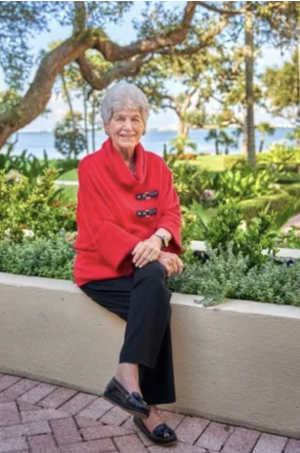Want to live longer and feel younger? A 96-year-old shares her secrets to a happier, healthier life
By
Veronica E.
- Replies 0
Disclaimer: The information provided in this article is for educational purposes only and is not intended as a substitute for professional medical advice, diagnosis, or treatment. Always consult your physician or other qualified healthcare providers with any questions you may have regarding a medical condition or before making any changes to your health regimen.
At 96, Nancy Schlossberg is often described as "the picture of longevity."
While flattered, she believes that a long, fulfilling life takes more than just good genes or luck.
She credits her resilience—adapting to change, staying mentally active, and finding purpose—as the true foundation of healthy aging.
Her personal experiences and reflections offer a meaningful perspective on navigating life’s later chapters with grace.
For those seeking more than just extra years, Schlossberg’s story is a guide to living those years well.

The Longevity Revolution: Why living longer is the new normal
According to the US Census Bureau, the number of Americans aged 100 and older is set to quadruple over the next 30 years.
By 2054, there could be over 400,000 centenarians in the US alone.
Experts refer to this phenomenon as the "Longevity Revolution," and it's changing how people work, play, love, and learn.
Books like Dr. Laura Carstensen’s A Long Bright Future and Dr. Joseph Coughlin’s The Longevity Economy shine a light on this new era.
But what does it really mean in practice, and how can people make the most of these bonus years?
Also read: Unlock a Happier, Healthier Life: The Surprising Household Habit That Can Boost Your Mood!
Schlossberg’s journey: resilience in the face of change
Schlossberg admits her path hasn’t always been smooth.
At age 90, she was full of energy, but a serious illness involving COVID-19 and pneumonia nearly ended her life.
By 95, her energy had declined, and she began asking herself, "If I can’t do what I used to, what can I do now? How do I keep making a difference?"
Like many older adults facing transitions such as retirement or illness, Schlossberg found that the key wasn’t to avoid change, but to embrace it, adapt, and seek new ways to contribute.
Also read: Want to live to 100? This affordable snack recommended by a longevity expert could be the key!
The art of navigating transitions
Schlossberg believes that the longer one lives, the more transitions they will face—retirement, new relationships, health changes, and more.
Rather than viewing these as endings, she encourages seeing them as invitations to reinvent oneself.
Take Gregg Kaplan, for example. At 72, he retired multiple times, started new businesses, and even met his wife through his carpentry hobby.
Still, each time he stepped away from work, he questioned whether he would still matter.
Also read: 101 and fabulous! Meet the glamorous grandma taking over the internet
The 4 S’s of coping with change
To navigate life’s changes, Schlossberg developed what she calls the "4 S System":
Those with strengths in these areas tend to manage transitions with greater ease and confidence.

Also read: Live to 100 with this simple diet change—centenarians’ secret revealed!
Finding purpose: Why "mattering" matters
One of Schlossberg’s core beliefs is that feeling like you matter is one of the most important keys to longevity.
Sociologist Morris Rosenberg coined the term "mattering" to describe the universal need to feel significant to others.
Schlossberg cites examples like Don Bunch, a retired food and beverage director, who found new purpose refurbishing a home and getting involved in his community after a restless first retirement.
The takeaway? Having a reason to get up in the morning can make all the difference.
Keep your mind sharp: the "use it or lose it" principle
Engaging in mentally stimulating activities is critical.
Research by Dr. Carmi Schooler and colleagues found that people who perform complex mental tasks retain better intellectual function as they age.
Schlossberg encourages readers to try puzzles, join book clubs, or take on new learning opportunities. It's never too late to challenge the brain.
Also read: Experts reveal the breakfast secret to a longer life—are you eating it?
Stay open to new opportunities
Aging doesn't have to mean slowing down—it can also mean discovering new paths.
Schlossberg recalls friends who found new careers or spiritual growth in later life.
One friend, Jeanne, shifted her focus to spiritual exploration after health issues forced her to stop working as a therapist.
Her story reflects the possibility of personal growth even during physical decline.
Also read: An unexpected journey: the tragic story behind a man transporting his deceased mother’s body
Practical tips for living longer and better
Here are Schlossberg's top tips for a longer, happier life:
Schlossberg’s journey is a reminder that aging is not just about longevity—it’s about continuing to grow, adapt, and contribute.
Her life offers proof that with purpose and resilience, the later chapters can be some of the most meaningful.
Read next: Scientists reveal: Eat these 6 miraculous foods to dramatically extend your life!

Schlossberg encourages others to share their stories and experiences. What’s your secret to staying young at heart? How have you handled big life transitions? Her message is clear: it’s never too late to live better. The best years might still be ahead.
At 96, Nancy Schlossberg is often described as "the picture of longevity."
While flattered, she believes that a long, fulfilling life takes more than just good genes or luck.
She credits her resilience—adapting to change, staying mentally active, and finding purpose—as the true foundation of healthy aging.
Her personal experiences and reflections offer a meaningful perspective on navigating life’s later chapters with grace.
For those seeking more than just extra years, Schlossberg’s story is a guide to living those years well.

Aging with resilience and purpose can bring new opportunities, growth, and fulfillment at any stage of life. Image Source: Pexels / RDNE Stock project.
The Longevity Revolution: Why living longer is the new normal
According to the US Census Bureau, the number of Americans aged 100 and older is set to quadruple over the next 30 years.
By 2054, there could be over 400,000 centenarians in the US alone.
Experts refer to this phenomenon as the "Longevity Revolution," and it's changing how people work, play, love, and learn.
Books like Dr. Laura Carstensen’s A Long Bright Future and Dr. Joseph Coughlin’s The Longevity Economy shine a light on this new era.
But what does it really mean in practice, and how can people make the most of these bonus years?
Also read: Unlock a Happier, Healthier Life: The Surprising Household Habit That Can Boost Your Mood!
Schlossberg’s journey: resilience in the face of change
Schlossberg admits her path hasn’t always been smooth.
At age 90, she was full of energy, but a serious illness involving COVID-19 and pneumonia nearly ended her life.
By 95, her energy had declined, and she began asking herself, "If I can’t do what I used to, what can I do now? How do I keep making a difference?"
Like many older adults facing transitions such as retirement or illness, Schlossberg found that the key wasn’t to avoid change, but to embrace it, adapt, and seek new ways to contribute.
Also read: Want to live to 100? This affordable snack recommended by a longevity expert could be the key!
The art of navigating transitions
Schlossberg believes that the longer one lives, the more transitions they will face—retirement, new relationships, health changes, and more.
Rather than viewing these as endings, she encourages seeing them as invitations to reinvent oneself.
Take Gregg Kaplan, for example. At 72, he retired multiple times, started new businesses, and even met his wife through his carpentry hobby.
Still, each time he stepped away from work, he questioned whether he would still matter.
Also read: 101 and fabulous! Meet the glamorous grandma taking over the internet
The 4 S’s of coping with change
To navigate life’s changes, Schlossberg developed what she calls the "4 S System":
- Situation: Is your life generally stable, or full of stress?
- Self: Are you naturally optimistic and resilient?
- Supports: Do you have friends, family, or community resources?
- Strategies: Are you flexible and resourceful in problem-solving?
Those with strengths in these areas tend to manage transitions with greater ease and confidence.

Nancy Schlossberg, 96, shares the mindset and habits that have helped her age with resilience, purpose, and joy. Image Source: USA TODAY/ Jennifer Walker.
Also read: Live to 100 with this simple diet change—centenarians’ secret revealed!
Finding purpose: Why "mattering" matters
One of Schlossberg’s core beliefs is that feeling like you matter is one of the most important keys to longevity.
Sociologist Morris Rosenberg coined the term "mattering" to describe the universal need to feel significant to others.
Schlossberg cites examples like Don Bunch, a retired food and beverage director, who found new purpose refurbishing a home and getting involved in his community after a restless first retirement.
The takeaway? Having a reason to get up in the morning can make all the difference.
Keep your mind sharp: the "use it or lose it" principle
Engaging in mentally stimulating activities is critical.
Research by Dr. Carmi Schooler and colleagues found that people who perform complex mental tasks retain better intellectual function as they age.
Schlossberg encourages readers to try puzzles, join book clubs, or take on new learning opportunities. It's never too late to challenge the brain.
Also read: Experts reveal the breakfast secret to a longer life—are you eating it?
Stay open to new opportunities
Aging doesn't have to mean slowing down—it can also mean discovering new paths.
Schlossberg recalls friends who found new careers or spiritual growth in later life.
One friend, Jeanne, shifted her focus to spiritual exploration after health issues forced her to stop working as a therapist.
Her story reflects the possibility of personal growth even during physical decline.
Also read: An unexpected journey: the tragic story behind a man transporting his deceased mother’s body
Practical tips for living longer and better
Here are Schlossberg's top tips for a longer, happier life:
- Stay Curious: Keep learning new things.
- Move Your Body: Regular, gentle activity can do wonders.
- Connect with Others: Build and maintain meaningful relationships.
- Eat Well, Sleep Well: A balanced diet and good sleep are foundational.
- Embrace Change: See life’s transitions as opportunities.
- Find Purpose: Engage in activities that make you feel relevant and needed.
Schlossberg’s journey is a reminder that aging is not just about longevity—it’s about continuing to grow, adapt, and contribute.
Her life offers proof that with purpose and resilience, the later chapters can be some of the most meaningful.
Read next: Scientists reveal: Eat these 6 miraculous foods to dramatically extend your life!
Key Takeaways
- Living longer means experiencing more transitions in life; managing these changes well is key to maintaining happiness and well-being as you age.
- Having a sense of purpose and 'mattering' to others is vital in retirement and older age—staying involved in meaningful activities helps boost intellectual and emotional health.
- Strong coping resources—like supportive relationships, optimism, and flexible strategies—make it easier to adapt to life’s unexpected changes and challenges as you get older.
- Longevity opens up opportunities for new careers, relationships, hobbies, and personal growth—even in the face of physical decline, being open to change can lead to continued fulfillment.
Schlossberg encourages others to share their stories and experiences. What’s your secret to staying young at heart? How have you handled big life transitions? Her message is clear: it’s never too late to live better. The best years might still be ahead.






